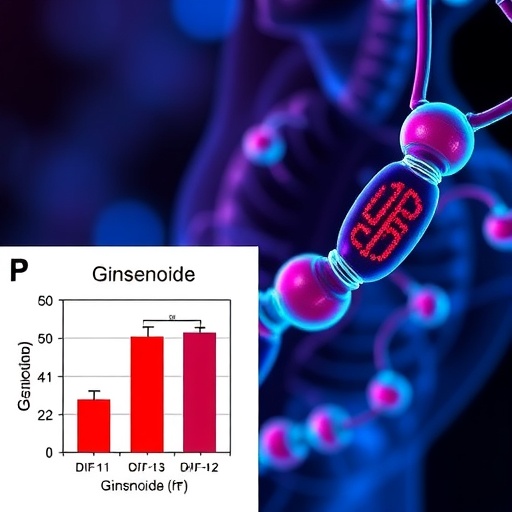A groundbreaking study published in BMC Complementary Medicine and Therapies has unveiled the profound potential of Ginsenoside Rf in enhancing glucose metabolism, particularly in models resistant to insulin. Conducted by researchers Hong, Lee, and Choi, along with their colleagues, the findings bring fresh hope in the fight against metabolic disorders such as diabetes. The study offers valuable insights that could pave the way for new therapeutic strategies in managing glucose levels and improving insulin sensitivity.
In the modern world, diabetes has emerged as one of the most pressing health concerns, with millions of individuals affected globally. The rise in insulin resistance, a hallmark of type 2 diabetes, underscores the necessity for innovative treatment modalities. Researchers have long been exploring natural compounds that could potentially mitigate these health issues. Ginsenoside Rf, a bioactive compound derived from ginseng, has attracted considerable attention for its promising pharmacological effects, particularly in metabolic regulation.
The novel research zeroes in on the role of Ginsenoside Rf in insulin-resistant AML12 cells, a common model used to study glucose metabolism and insulin actions. By employing advanced biochemical methodologies and in-depth analyses, the authors meticulously dissect the underlying mechanisms by which Ginsenoside Rf exhibits its beneficial effects on glucose metabolism and insulin sensitivity. This study significantly contributes to the existing literature on herbal medicine and its application in managing metabolic diseases.
One of the crucial findings of this study revolves around the signaling pathways involved in glucose metabolism. The researchers elucidated that Ginsenoside Rf activates the IRS/PI3K/Akt signaling pathway, which is vital for insulin signaling and mediating glucose uptake in cells. This activation leads to enhanced glucose uptake, providing a critical mechanism by which Ginsenoside Rf exerts its metabolic effects. The authors meticulously describe how this signaling cascade plays a role in promoting insulin sensitivity and improving glucose homeostasis in insulin-resistant settings.
Additionally, the study highlights the involvement of the PPARα/PGC1α signaling pathway. Peroxisome proliferator-activated receptors (PPARs), particularly PPARα, are known for their roles in lipid metabolism and energy homeostasis. By engaging this pathway, Ginsenoside Rf not only enhances glucose metabolism but also facilitates the regulation of fatty acid oxidation. The combined activation of both IRS/PI3K/Akt and PPARα/PGC1α pathways suggests a multifaceted approach through which Ginsenoside Rf can combat insulin resistance and improve overall metabolic health.
The implications of these findings are profound. Understanding the dual action of Ginsenoside Rf on both glucose and lipid metabolism provides a holistic view of managing insulin resistance. This highlights the therapeutic potential of employing natural compounds in addressing complex metabolic conditions. The promising results from the in vitro model may warrant further exploration in vivo, leading researchers to consider clinical trials to substantiate these effects in human populations.
Moreover, the safety profile of Ginsenoside Rf further augments its appeal as a therapeutic candidate. Natural products historically have been associated with fewer side effects than synthetic compounds. This presents a significant advantage, especially for individuals who are sensitive to pharmaceuticals or are looking for adjunct therapies to enhance conventional treatments for diabetes.
The study also opens avenues for future research. Exploring the synergistic effects of Ginsenoside Rf with other therapeutic agents could amplify its benefits. Moreover, investigating the pharmacokinetics and optimal dosing regimens will be critical steps in translating these laboratory findings into clinical practice. The potential to incorporate Ginsenoside Rf into dietary recommendations or as a supplement could offer a revolutionary approach to managing insulin resistance.
Furthermore, the broader implications of this research extend beyond diabetes management. As the world grapples with increasing obesity rates and metabolic syndrome prevalence, Ginsenoside Rf could serve as a core component in preventive strategies. Public health interventions aimed at reducing the risk of metabolic diseases could benefit from including such natural agents in lifestyle recommendations.
It’s paramount to acknowledge that while the results are promising, additional research is necessary to fully comprehend the extent of Ginsenoside Rf’s effects and to clarify its mechanisms further. Long-term studies and clinical trials will be crucial in establishing not only efficacy but also safety in diverse populations.
In conclusion, the work spearheaded by Hong et al. represents a significant leap towards understanding the impact of Ginsenoside Rf on glucose metabolism in insulin-resistant settings. Their findings could herald a new chapter in the management of metabolic disorders, with the potential for Ginsenoside Rf to emerge as a vital ally in improving insulin sensitivity and overall health. The integration of such natural compounds into therapeutic regimes holds hope for a future where metabolic diseases can be more effectively managed through holistic and integrative approaches.
Ultimately, as the scientific community continues to unravel the complexities of metabolism and its disruptions, Ginsenoside Rf stands out as a beacon of hope—a testament to the potential of nature in combating the growing epidemic of diabetes and related conditions.
Subject of Research: Insulin resistance and glucose metabolism improvement via Ginsenoside Rf.
Article Title: Ginsenoside Rf improves glucose metabolism via the IRS/PI3K/Akt and PPARα/PGC1α signaling pathways in insulin-resistant AML12 cells.
Article References:
Hong, S., Lee, J., Choi, S.Y. et al. Ginsenoside Rf improves glucose metabolism via the IRS/PI3K/Akt and PPARα/PGC1α signaling pathways in insulin-resistant AML12 cells.
BMC Complement Med Ther 25, 340 (2025). https://doi.org/10.1186/s12906-025-05091-7
Image Credits: AI Generated
DOI: https://doi.org/10.1186/s12906-025-05091-7
Keywords: Ginsenoside Rf, insulin resistance, glucose metabolism, IRS/PI3K/Akt signaling, PPARα/PGC1α pathways, diabetes management.
Tags: advanced biochemical methodologiesAML12 cell studiesbioactive compounds in healthdiabetes natural remediesGinsenoside Rfglucose metabolism enhancementinnovative diabetes treatmentsinsulin resistance treatmentinsulin sensitivity improvementmetabolic disorders managementpharmacological effects of ginsengtherapeutic strategies for diabetes





